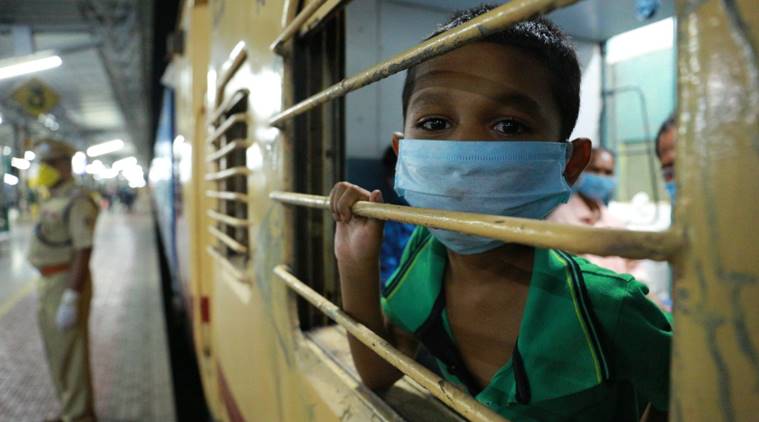 In states like Kerala, there has been little clarity on who will foot the bill for the tickets of the workers. (Source: Kerala PRD)
In states like Kerala, there has been little clarity on who will foot the bill for the tickets of the workers. (Source: Kerala PRD)
Several migrant workers, who boarded the first train from Kerala for their native Odisha on May 1 have alleged the ticket examiner threatened to deboard them if they didn’t pay for the 34-hour journey. They said they reached home thanks to the gratitude of their friends who lent them money for the train tickets.
Manas Sahoo, 24, who works in a plywood factory in Perumbavoor on the outskirts of Kochi, was beaming when his employer informed him that there were seats available on a train to Odisha on May 1. After a month-long lockdown and no work, his savings had completely drained away. There was little meaning in staying back, he realised. So he packed his bags with a few clothes and joined his friends for the preliminary registration and medical screening. He enquired with the police and health officials whether he would have to pay for the train tickets. He was told no.
“But after I entered the train coach, a TTE and two police officials came up to me and said I have to pay Rs 530 for the ticket. I was taken aback because I had very little money. The TTE shouted at us that we would be dropped off the train if we didn’t pay. So I asked my friend if he had money. Luckily, he had. I borrowed the money and promised him that I would pay him after reaching home,” said Sahoo, over the phone, from a quarantine centre in Balasore district of Odisha.
“Bahut bura laga (I felt very bad),” he added, about the TTE’s remarks. “I wanted to go home so badly so I paid up.”
Dipak Parihadi, another plywood factory worker in Perumbavoor hailing from Odisha’s Bhadrak, had the same experience. His employer had given him Rs 500 for expenses that he may incur on the train. But after boarding the train, Parihadi realised that he will have to shell out Rs 530 for the tickets. “I gave the Rs 500 I had and borrowed Rs 30 from my friend. I didn’t have any money left but somehow I reached home,” he said.
An elderly man travelling alongside him unfortunately had only Rs 500. “The TTE took away his medical certificate which was mandatory for travel. Then some of us pleaded with him to let the elderly man travel. Finally, he agreed to let the Rs 30 off,” said Parihadi.
In states like Kerala, there has been little clarity on who will foot the bill for the tickets of the workers. Officials of the state government and the Railways pinned responsibility on each other on taking care of the expenses. Finally, it was down to the workers who had to borrow money from their friends and families to pay for the tickets.
Chandan Mallick, whose friend helped him out by sponsoring his ticket, said, “They (TTE and police) said they will throw us out if we didn’t pay. We paid out of fear.”